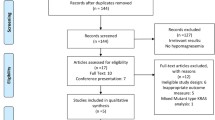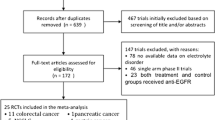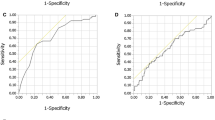Abstract
Purpose
Cetuximab and panitumumab are monoclonal antibodies that target the epidermal growth factor receptor (EGFR). Treatment with cetuximab and panitumumab commonly causes hypomagnesemia, and optimal management of this adverse effect remains unclear. Here, we evaluated the optimal magnesium replacement points based on the risk of severe hypomagnesemia in colorectal cancer patients who received cetuximab or panitumumab.
Methods
We retrospectively evaluated 184 patients who received cetuximab or panitumumab for colorectal cancer at Ogaki Municipal Hospital (Ogaki, Japan) between January 2010 and December 2019. Univariate analyses were conducted to evaluate the relationship between patient baseline characteristics and development of hypomagnesemia following cetuximab or panitumumab treatment. Variables that were significantly associated with hypomagnesemia in the univariate analyses as well as previously reported risk factors were entered into a multivariate logistic regression model.
Results
The incidence of hypomagnesemia was associated with panitumumab treatment, pre-replenishment serum magnesium concentration, treatment duration, and treatment line. Severe hypomagnesemia post-cetuximab or panitumumab treatment was significantly associated with low baseline magnesium concentrations (< 1.8 mg/dL; odds ratio 18.100, 95% confidence interval 1.570–210.000; p = 0.020) and low serum magnesium concentrations during treatment (< 1.1 mg/dL; odds ratio 93.800, 95% confidence interval 3.510–2510.000; p = 0.007).
Conclusion
To minimize the risk of severe hypomagnesemia during anti-EGFR treatment, magnesium replenishment should be initiated in patients with pre-replenishment concentrations of < 1.8 mg/dL, preferably before reaching intra-treatment concentrations of < 1.1 mg/dL.

Similar content being viewed by others
Availability of data and material
All relevant data are included in the manuscript and its associated files.
References
Price TJ, Peeters M, Kim TW et al (2014) Panitumumab versus cetuximab in patients with chemotherapy-refractory wild-type KRAS exon 2 metastatic colorectal cancer (ASPECCT): a randomised, multicentre, open-label, non-inferiority phase 3 study. Lancet Oncol 15:569–579
Jonker DJ, O'Callaghan CJ, Karapetis CS et al (2007) Cetuximab for the treatment of colorectal cancer. N Engl J Med 15:2040–2048
Cunningham D, Humblet Y, Siena S et al (2004) Cetuximab monotherapy and cetuximab plus irinotecan in irinotecan-refractory metastatic colorectal cancer. N Engl J Med 22:337–345
Bokemeyer C, Bondarenko I, Makhson A et al (2009) Fluorouracil, leucovorin, and oxaliplatin with and without cetuximab in the first-line treatment of metastatic colorectal cancer. J Clin Oncol 10:663–671
Van Cutsem E, Köhne CH, Hitre E et al (2009) Cetuximab and chemotherapy as initial treatment for metastatic colorectal cancer. N Engl J Med 360:1408–1417
Van Cutsem E, Peeters M, Siena S et al (2007) Open-label phase III trial of panitumumab plus best supportive care compared with best supportive care alone in patients with chemotherapy-refractory metastatic colorectal cancer. J Clin Oncol 25:1658–1664
Peeters M, Price TJ, Cervantes A et al (2010) Randomized phase III study of panitumumab with fluorouracil, leucovorin, and irinotecan (FOLFIRI) compared with FOLFIRI alone as second-line treatment in patients with metastatic colorectal cancer. J Clin Oncol 28:4706–4713
Douillard JY, Siena S, Cassidy J et al (2010) Randomized, phase III trial of panitumumab with infusional fluorouracil, leucovorin, and oxaliplatin (FOLFOX4) versus FOLFOX4 alone as first-line treatment in patients with previously untreated metastatic colorectal cancer: the PRIME study. J Clin Oncol 28:4697–4705
Ikari A (2013) Molecular mechanism of magnesium transport in renal tubule. Seikagaku 85:574–577 (article in Japanese)
de Baaij JH, Hoenderop JG, Bindels RJ (2015) Magnesium in man: implications for health and disease. Physiol Rev 95:1–46
Wang Q, Qi Y, Zhang D et al (2015) Electrolyte disorders assessment in solid tumor patients treated with anti-EGFR monoclonal antibodies: a pooled analysis of 25 randomized clinical trials. Tumor Biol 36:3471–3482
Fujii H, Iihara H, Suzuki A et al (2016) Hypomagnesemia is a reliable predictor for efficacy of anti-EGFR monoclonal antibody used in combination with first-line chemotherapy for metastatic colorectal cancer. Cancer Chemother Pharmacol 77:1209–1215
Hsieh MC, Wu CF, Chen CW et al (2018) Hypomagnesemia and clinical benefits of anti-EGFR monoclonal antibodies in wild-type KRAS metastatic colorectal cancer: a systematic review and meta-analysis. Sci Rep 8:2047
Vincenzi B, Galluzzo S, Santini D et al (2011) Early magnesium modifications as a surrogate marker of efficacy of cetuximab-based anticancer treatment in KRAS wild-type advanced colorectal cancer patients. Ann Oncol 22:1141–1146
Vickers M, Karapetis CS, Tu D et al (2013) Association of hypomagnesemia with inferior survival in a phase III, randomized study of cetuximab plus best supportive care versus best supportive care alone: NCIC CTG/AGITG CO.17. Ann Oncol 24:953–960
Jiang DM, Dennis K, Steinmetz A et al (2016) Management of epidermal growth factor receptor inhibitor-induced hypomagnesemia: a systematic review. Clin Colorectal Cancer 15:117–123
Nakazawa Y, Ando N, Harada D et al (2018) Retrospective investigation of the risk factors for severity in panitumumab-induced hypomagnesemia. Gan To Kagaku Ryoho 45:1435–1440 (article in Japanese)
Inose R, Takahashi K, Nishikawa T et al (2015) Analysis of factors influencing the development of hypomagnesemia in patients receiving cetuximab. Yakugaku Zasshi 135:1403–1407 (article in Japanese)
Petrelli F, Borgonovo K, Cabiddu M et al (2012) Risk of anti-EGFR monoclonal antibody-related hypomagnesemia: systematic review and pooled analysis of randomized studies. Expert Opin Drug Saf 11:S9–19
Sato J, Ishikawa H, Tanaka R et al (2019) Influence of oral magnesium-containing supplement and antacid administration on hypomagnesemia induced by panitumumab. Cancer Chemother Pharmacol 83:673–679
Tsujii T, Ogaki T, Nakae K et al (2016) Correlation between blood magnesium and calcium concentration in patients treated with an anti-EGFR antibody. J Pharm Health Care Sci 2:23
Demizu M, Ueda H, Osawa M et al (2013) Effect of magnesium supplementation on early-stage hypomagnesemia in patients treated with cetuximab. Gan To Kagaku Ryoho 40:897–900
Nakamoto E, Kawakami K, Imada Y (2011) Retrospective investigation on cetuximab-induced hypomagnesemia; incidence, time of onset and management. Jpn J Pharm Health Care Sci 37:403–409 (article in Japanese)
US Department Of Health And Human Services: Common terminology criteria for adverse events (CTCAE) version 4.0. United States, National Cancer Institute, 2009. https://www.acrin.org/Portals/0/Administration/Regulatory/CTCAE_4.02_2009-09-15_QuickReference_5X7.pdf
Kanda Y (2013) Investigation of the freely available easy-to-use software ‘EZR’ for medical statistics. Bone Marrow Transplant 48:452–458
Pham PC, Pham PA, Pham SV et al (2014) Hypomagnesemia: a clinical perspective. Int J Nephrol Renovasc Dis 9:219–230
Mackay JD, Bladon PT (2010) Hypomagnesaemia due to proton-pump inhibitor therapy: a clinical case series. Q J Med 103:387–395
Fakih MG, Wilding G, Lombardo J (2006) Cetuximab-induced hypomagnesemia in patients with colorectal cancer. Clin Colorectal Cancer 6:152–156
Funding
No specific funding was obtained for this study.
Author information
Authors and Affiliations
Contributions
MK contributed to the study design, collected, and provided the data, was the principal author of the report, and is the guarantor of the article and all data. EU, HT, and TY contributed to the study design, reviewed the article, and supervised drafting the report and the submission process. All authors approved the final version of the article.
Corresponding author
Ethics declarations
Conflict of interest
The authors declare that they have no conflicts of interest.
Ethics approval
The study’s retrospective protocol was approved by the Institutional Review Board of Ogaki Municipal Hospital (20200528-3).
Additional information
Publisher's Note
Springer Nature remains neutral with regard to jurisdictional claims in published maps and institutional affiliations.
Rights and permissions
About this article
Cite this article
Kimura, M., Usami, E., Teramachi, H. et al. Identifying optimal magnesium replenishment points based on risk of severe hypomagnesemia in colorectal cancer patients treated with cetuximab or panitumumab. Cancer Chemother Pharmacol 86, 383–391 (2020). https://doi.org/10.1007/s00280-020-04126-9
Received:
Accepted:
Published:
Issue Date:
DOI: https://doi.org/10.1007/s00280-020-04126-9




